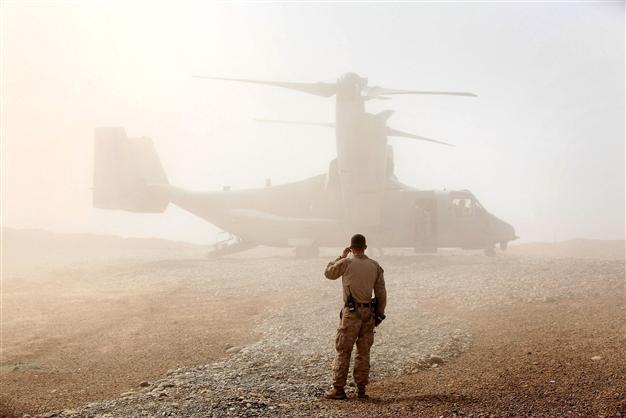Afghans angry over removal of accused US soldier
KABUL, Afghanistan - The Associated Press

A U.S. Marine watches as an Osprey carrying U.S. Defense Secretary Leon Panetta arrives at Forward Operating Base Shukvani, Afghanistan March 14, 2012. REUTERS Photo
Afghan lawmakers expressed anger Thursday over the U.S. move to fly an American soldier accused of killing 16 civilians out of the country to Kuwait, saying Kabul shouldn't sign a strategic partnership agreement with Washington unless the suspect faces justice in Afghanistan.Negotiations over the agreement, which would govern the presence of U.S. forces in Afghanistan after most combat troops withdraw by the end of 2014, were tense even before the shooting deaths of the civilians, including nine children, in southern Kandahar province on Sunday.
The killings came in the wake of violent protests last month triggered by American soldiers who burned Muslim holy books and other Islamic texts. Over 30 people were killed in those demonstrations, and Afghan forces turned their guns on their supposed allies, killing six U.S. soldiers.
The U.S. flew the suspect out of the country on Wednesday evening, said U.S. officials. The U.S. military said the transfer did not preclude the possibility of trying the case in Afghanistan.
But that didn't appease Afghans upset at the move.
"It was the demand of the families of the martyrs of this incident, the people of Kandahar and the people of Afghanistan to try him publicly in Afghanistan," said Mohammad Naeem Lalai Hamidzai, a Kandahar lawmaker who is part of a parliamentary commission investigating the shootings.
The U.S. informed Afghan leaders that the soldier was going to be moved and "they understood," said U.S. Lt. Gen. Curtis Scaparotti, deputy commander of American forces in Afghanistan. Moving the suspect will allow the U.S. to provide pretrial confinement, access to legal representation and the ability to ensure fair and proper judicial proceedings, he said.
Afghan government officials have not responded to request for comment on the transfer.
The Pentagon has said the U.S. does not have appropriate detention facilities in Afghanistan.
In Kuwait, U.S. Army spokesman Lt. Col. David Patterson said Thursday that the detention unit there, known as a Theater Field Confinement Facility, holds pre-trial detainees and post-trial confinees for a limited amount of time.
He would not confirm any further details about the case.
The Kuwait detention facilities have been used for other U.S. troops. The most prominent detainee recently was Army PFC Bradley Manning, who was held there after he was taken into custody in Baghdad in 2010 for allegedly leaking government documents in the WikiLeaks case.
Abdul Khaliq Balakarzai, another Kandahar lawmaker, said President Hamid Karzai should respond to the U.S. decision to move the soldier by refusing to sign the strategic partnership agreement.
"If the trial was in Afghanistan, the people would see that America doesn't like this soldier and wants to punish him," said Balakarzai. "But unfortunately America ignored our demand." Haji Abdul Ghani, a tribal elder from the area of Panjwai district where the shooting spree occurred warned the U.S. move would cause "people to rise up and increase the hostility between Afghanistan and America." U.S. officials have expressed their shock and sadness over the massacre and have promised a thorough investigation. But they have resisted calls both at home and in Afghanistan to speed up the withdrawal of American troops in the wake of the tragedy.
U.S. Defense Secretary Leon Panetta visited Afghanistan on Wednesday, the first American official to visit the country since the shootings.
His visit was marred by a bizarre incident in which an Afghan man crashed a stolen truck at an airfield in southern Afghanistan as the defense secretary's plane was landing and then exited the vehicle in flames.
Scaparotti, the deputy U.S. commander, told reporters traveling with Panetta in Kabul that he believed the man — an interpreter working for foreign forces was targeting a group of U.S. Marines assembled on the ramp, not the defense secretary. He said it would have been difficult to know which plane the defense secretary was aboard.
"There was a puff of smoke and he came out engulfed in flames," Scaparotti said.
The man died Thursday of extensive burns, said the U.S. commander.
No one in Panetta's party was hurt. The defense secretary was told about the incident after he got off the aircraft.
Authorities were not able to talk to or get any information from the driver before he died.
A U.S. military official said a British soldier was injured when he tried to stop the driver from stealing the truck on the base. The Afghan man hit the British soldier with the truck as he was driving away. The official spoke on condition of anonymity because the incident is still being investigated.
The U.S. Army staff sergeant accused of carrying out the shooting spree in Kandahar has been identified as a married, 38-year-old father of two who was trained as a sniper and had served three tours in Iraq, where he recently suffered a head injury.
The U.S. has not released the name of the soldier partly because of security concerns for the individual and his family, said Scaparotti.
The U.S. soldier allegedly slipped out of his small base in southern Afghanistan before dawn Sunday, crept into three houses and shot men, women and children at close range, then burned some of the bodies. By sunrise, there were 16 corpses.
The suspect was taken into custody shortly afterward.
The soldier's trial is not the only point of contention in the case. The U.S. has said the killings were carried out by a single shooter, but some Afghan officials and local villagers have insisted that at least two soldiers were involved.
















